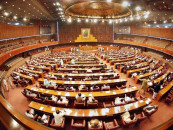Govt unveils first-ever Rs40,000 prize bond
The launch may also provide an impetus to the national savings

The launch may also provide an impetus to the national savings. PHOTO: PPI
Finance Minister Ishaq Dar launched the new prize bond at a ceremony held at the State Bank of Pakistan’s Islamabad Office. Earlier, unregistered bonds of Rs25,000 and Rs40,000 denomination were available in the market.
Govt considers scrapping Rs25k, Rs40k prize bonds
Speaking at the bond launching ceremony, Finance Minister Ishaq Dar said that the first prize of the bond is Rs80 million, whereas after six months profit on the bond will also be paid to the holders. He said that a printed receipt will be given to the buyer of the bond and there was no limit and period of the investment, adding every person except banks, could buy the bonds.
The Tax Reforms Commission that the government had set up to reform the tax system proposed that a new strategy be adopted on borrowings through prize bonds. The TRC findings showed that the high denomination unregistered bonds were the main source of “corruption and tax evasion”.
The practice involved purchase of the prize bonds in addition to the possession of the script wherein people tend to get the money whitened, according to TRC findings. To tackle the issue of the previous bonds, the TRC had proposed a two-pronged strategy, suggesting the government deposit these bonds in banks in the first phase and then subsequently discontinue them. However, the government has not yet come up a solution to handle the old bonds.
The finance ministry was concerned that the retirement of debt raised through these two types of bonds could affect its borrowing plans.
In the past three years, the stock of the prize bonds has almost doubled to Rs681 billion, indicating that the people found it an easy way to hide their wealth. The significant share of increase was in case of Rs25,000 denomination bonds that increased from Rs40 billion to Rs102 billion in the past three years.
Similarly, the investment in Rs40,000 prize bonds increased from Rs118 billion to Rs194 billion in the past three years.
Prize bonds offer relatively low interest rates compared with other borrowing instruments, thus, providing a cheap source of borrowings to the government that is facing the challenge of bridging the ever-widening budget deficit.
Govt draws up aggressive tax package
The fresh launch may also provide an impetus to the national savings that have been constantly in decline. During the first half (July-December) of this fiscal year, the Directorate of National Savings Schemes could mobilise only Rs113.5 billion – 20% down when compared with the same period of the last fiscal year.
The directorate of National Savings Schemes issues these prize bonds but their performance remained below par since the government came to power. In 2012-13, the directorate had mobilised Rs386 billion for budget financing, which came down to Rs207 billion in 2013-14. It again rose to Rs337 billion in 2014-15 but then dipped to Rs233 billion in the last fiscal year, according to the State Bank of Pakistan.
One of the main challenges of the government is increasing savings to the gross domestic product ratio that not only remained stagnant in the past three years but also was far lower than the ratios in the developing countries. Savings remained almost stagnant at 14.5% of GDP, shy of the target of 16.8% during the fiscal year 2015-16.
Due to low saving ratios, the country’s dependence on borrowings phenomenally increased, resulting in under investment in the infrastructure sector.
The finance minister said that after the successful launching of Rs40,000 premium prize bond, another prize bond worth Rs100,000 would also be launched to encourage savings.
The minister said that public sector debt was still low as compared to a number of developing countries. The government was in violation of the debt-to-GDP ratio limit by the end of the last fiscal year, imposed under Fiscal Responsibility and Debt Limitation Act of 2005. It subsequently amended the law and changed the goalpost to avoid criticism.
Published in The Express Tribune, March 11th, 2017.




1735037907-0/Tribune-N-(2)1735037907-0-208x130.webp)














COMMENTS
Comments are moderated and generally will be posted if they are on-topic and not abusive.
For more information, please see our Comments FAQ